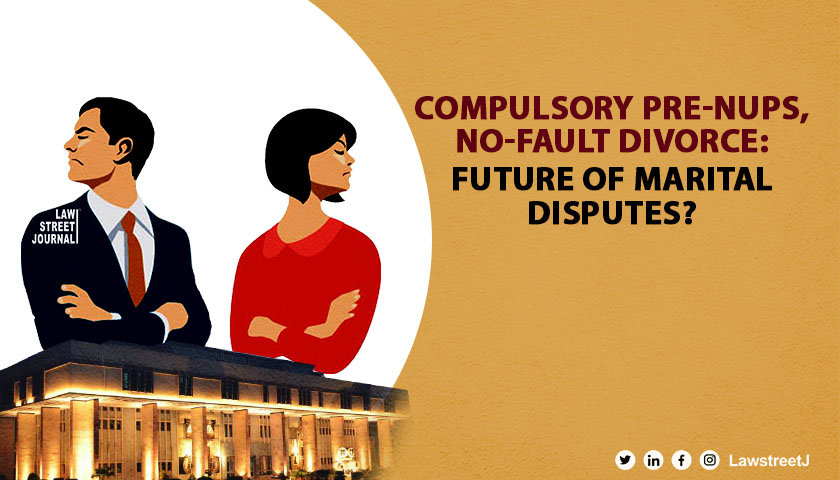New Delhi: Allowing a 12-year-old couple with one daughter a no-fault divorce, a Delhi Court has held that in cases of acrimonious matrimonial discord where the spouses have made grave allegations against each other and have no hope of living together, it would be cruel not to dissolve the marriage.
In their 12-year marriage the couple had been involved in legal battles for nearly 7 years due to disagreement on issues, despite mutually wanting a divorce.
The Court noted that in recent years there has been a trend for matrimonial disputes to have no actual cruelty, but only a mutual decision to end the marriage. However, even in such cases to walk out of the marriage one has no option but to approach the Court and make allegations against the other.
In the present case, despite both parties wanting a divorce, due to disagreement over other issues, they were unable to opt for the option of divorce with mutual consent.
This was because during the course of the proceedings it was found out that although on all dates of hearing the wife would tell the Court (on being asked whether she wanted a settlement) that she merely wanted "mukti" from the marriage. However, unaware of legal technicalities, she did not know that she herself was opposing the divorce sought by the husband.
On being made aware of the situation, she amended her Written Submissions, to incorporate a counter prayer for grant of divorce.
The Court thus noted that "though both are willing to break their matrimonial ties permanently since (the) beginning of the litigation but even at the fag end of the trial/case, they could not agree till date for divorce by mutual consent since they could not agree on other issues involved between them."
In such cases, the Court said that refusing to dissolve a marriage merely because one party has not been able to prove the fault of the other, would amount to forcing the parties to suffer further.
Thus, it said that prenuptial agreements wherein parties to a marriage decide terms to it beforehand by way of a contract - should be made mandatory so that parties do not face law-induced mental cruelty.
On compulsory pre-nuptials
Family Courts Judge Harish Kumar said, (The) Time has come to make compulsory prenuptial agreement to be executed before appointed authority after counseling of the parties about the possible risk of marriage going haywire for variety of reasons and making it mandatory to report breach every time breach occurs under intimation to the party allegedly at fault, making it further clear that if breach not reported he/she would not be heard later on that he/she did not report thinking that she/he would improve," the Court said.
This Court, therefore, in the present case in the facts and circumstances as noted above, without going into question as who is at fault so as to allow husband's or wife's prayer for dissolution of their marriage on fault theory, hereby dissolve their marriage under Section 13B of the Hindu Marriage Act, 1955 taking their respective prayer to dissolve their marriage (based on the faults of other) as their respective consent to dissolve their marriage, from the date of decree to be drawn up following this judgement, the Court said.
Stating that in such cases where the parties are levelling allegations of cruelty only to walk out of the marriage - the Courts time and effort is expended into a wild goose chase of sorts to find out something which never existed because difference of opinion and disagreements are also reported as an act of cruelty.
On 50-50 expenses of child
In a fresh take on the matter of marital discord, as opposed to the practice of one party being compelled to pay hefty maintenance to the other resulting in long-drawn legal disputes - the Court also directed both parents to bear 50% of the daughters reasonable expenses.
Giving the father daily regular access and weekend overnight access to the child, the Court also directed the mother to get the name of the father added in the daughter's school records and kept both the parents as legal guardians of the child for school, academic and extracurricular purposes.
Rationale and spirit behind the decision
Pointing out that the spirit of the Family Court Act is to bring about a settlement between the parties, the Court highlighted that this would mean putting a quietus to their dispute.
It justified its decision with the alternative that in the present case if either partys prayer was accepted, holding the other spouse guilty, the person against whom the findings would go would approach the next court and so on and so forth.
Allowing these continued rounds of litigation would result in further agony and harassment.
Similarly, refusal of their respective prayer, if they failed to prove their allegation, would also lead to law-induced mental cruelty as discussed above, the Court explained further.








![Having initiated divorce, Muslim woman cannot claim maintenance: Kerala High Court [Read Order]](/secure/uploads/2023/10/lj_6979_4491d0c7-5c79-4407-93fc-e1f942906294.jpg)
![SC directs sale of ancestral properties to pay Rs 1.25 crore maintenance to woman, whose husband abandoned her & fled to Australia [Read Judgment]](/secure/uploads/2023/10/lj_6369_815d29ae-3114-4643-8d69-e9cc82a9e242.jpg)






